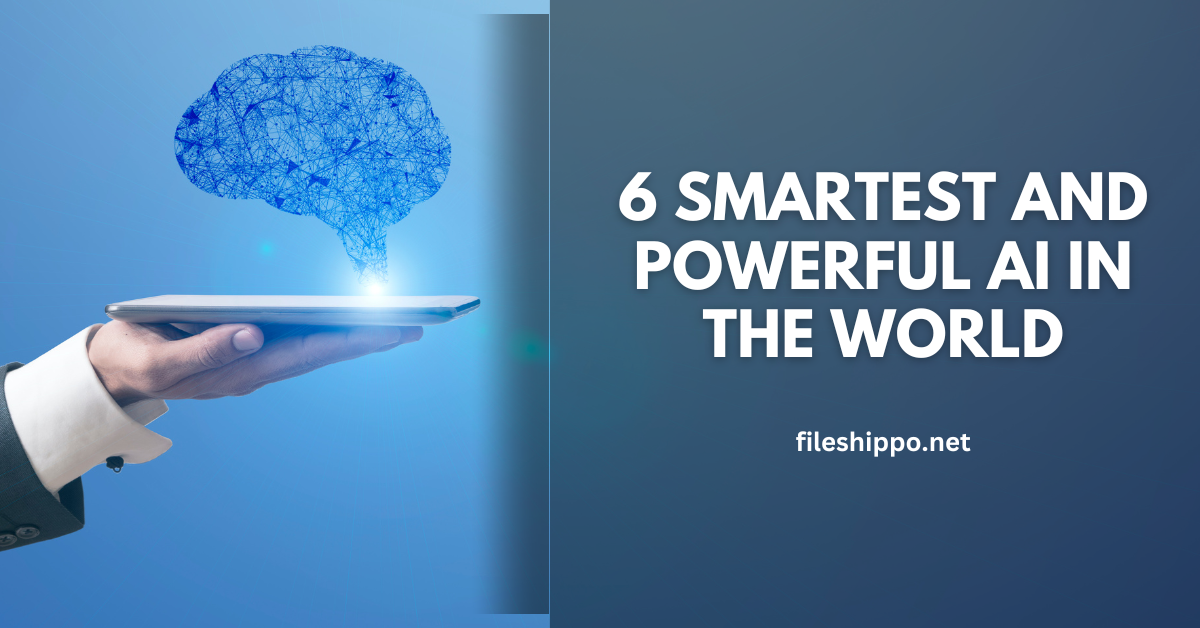As we are growing, technology is growing faster. In 2023, it has made many changes in the world, bringing new opportunities for people to work with AI. Artificial intelligence (AI) has become one of the most significant technological advancements in recent years. The concept of creating machines capable of intelligent behaviour has mesmerized the invention of scientists, researchers, and the general public alike. So the immense increase in technological advancement today, we will discuss and cover the topic of What is the smartest AI in the world, discussing the other facts regarding AI.
Also Read: tools for financial analysts
Table of Contents
Definition of Artificial Intelligence
Artificial intelligence involves human intelligence simulation in machines programmed to think, learn, and problem-solve. It has various techniques and methodologies to create systems that can perform tasks requiring human intelligence, such as visual perception, speech recognition, decision-making, natural language understanding and essay creator ai.
As AI technology continues to grow rapidly, there is a growing interest in determining which AI system can be considered the smartest. This interest arises from the wish to understand the limits of AI abilities and their potential impact on various factors of human life, including industries, healthcare, transportation, and more.
Intelligence in the Context of AI
When considering the smartest AI systems, it is important to define intelligence in the context of AI. Intelligence, in this case, refers to the ability of an AI system to actually perform complex tasks, learn from experience, adapt to new situations, and demonstrate human-like cognitive abilities. The dimensions of intelligence in AI are frequently based on aspects such as problem-solving skills, knowledge acquisition, decision-making capabilities, and creativity.
Different Types of AI Intelligence
AI intelligence can be categorized into different types based on the specific capabilities indicated by the systems. Some common types of AI intelligence include:
- Narrow AI: Narrow AI refers to AI systems designed to perform specific tasks quite well but lack the more general mind capabilities of human intelligence. Some examples are voice assistants, image recognition systems, and suggestion algorithms.
- General AI: General AI aims to develop AI systems capable of performing any academic task that a human can do. These systems keep intelligence equal to or exceeding human capabilities across various domains.
- Superintelligent AI: Superintelligent AI goes beyond human-level intelligence and has the potential to outperform humans in nearly all tasks. This level of AI intelligence remains speculative but has been a subject of extreme speculation and debate.
Most Advanced AI Giants In the Field
Several organizations and research institutions have made significant contributions to AI, driving the development of increasingly smart systems. Let’s explore some of the leading AI superpowers and their notable achievements:
Google’s DeepMind
DeepMind, a subsidiary of Google, has emerged as a frontrunner in AI intelligence. Their AI systems have achieved incredible feats, such as defeating world champions in complex games like chess, Go, and poker.
Google’s DeepMind focuses on developing general-purpose machine learning and artificial intelligence technologies to solve complex computational problems. Founded in 2010 and acquired by Google in 2014, DeepMind aims to build systems that learn and exhibit intelligence comparable to or even exceeding human intelligence. DeepMind’s AI has achieved success in games like Go and Atari, protein folding, and healthcare applications. DeepMind researchers have pushed the boundaries of deep reinforcement learning by developing algorithms that enable AI agents to learn complex behaviours and skills by interacting directly with high-dimensional environments.
IBM Watson
IBM Watson is a cognitive AI technology platform developed by IBM that uses natural language processing and machine learning to reveal insights from large amounts of unstructured data. Named after IBM’s first CEO Thomas J. Watson, the AI technology was first designed to answer questions posed in natural language. It analyzes the question, hypothesises the possible answers, and then provides a most likely response along with a confidence score.
IBM has commercialized Watson and applies it to various industries, including healthcare tech startups, to identify patient care options. Watson embraces AI technologies like machine learning, deep learning, and natural language processing to provide insights from vast knowledge sources.
OpenAI

OpenAI is an AI research and deployment company co-founded by Elon Musk and Sam Altman in 2015. The non-profit aims to build safe artificial general intelligence and ensure AI technologies benefit all of humanity. OpenAI pursues this mission by openly publishing its research for others to build upon, creating ethical AI technologies, and advocating for policies that ensure AI’s benefits outweigh any risks.
OpenAI’s GPT-3 (Generative Pre-trained Transformer 3) model has garnered significant attention for its impressive natural language processing capabilities. GPT-3 can generate coherent and contextually relevant text, making it a powerful tool for various applications such as writing, translation, and conversational agents.OpenAI researchers study how to create generally intelligent AI agents that achieve artificial general intelligence. Open AI’s Chat Gpt 3.5 and Gpt 4 come with premium features.
Xiaoice
Xiaoice is an AI chatbot created by Microsoft. She can carry on conversations with humans on various topics using natural language. Launched in 2014, Xiaoice quickly gained popularity in China by engaging users through emotional interactions. She is designed to be an empathetic AI companion who can adapt to different conversational styles and moods.
Xiaoice uses natural language understanding and generation capabilities powered by machine learning and AI techniques. Through conversations with users, she learns patterns in how humans talk and respond. Her personality and responses evolve over time to become more human-like and relatable. Apart from chatting, Xiaoice can also provide information, play music and make recommendations. She aims to provide emotional support, infotainment, and companionship to users.
AlphaGo
AlphaGo is an AI technology developed by Google DeepMind that plays the board game Go. First defeating a top professional Go player in 2016, AlphaGo demonstrated a breakthrough in the capabilities of AI. Go is considered a more complex game than chess due to its nearly limitless possibilities. AlphaGo uses two main neural networks – one that selects the next move and the other that evaluates board positions.
The AI trained by playing millions of games against itself, strengthening the neural networks with each move. Over time, AlphaGo’s decisions and strategy evolved to defeat all human players. The follow-up program AlphaGo Zero completely surpassed the original AlphaGo by training purely through self-play reinforcement learning without human data.
AlphaZero
AlphaZero is an AI program created by Google’s DeepMind that teaches itself how to play chess and shogi and Go from scratch to a superhuman level in a few hours. It was trained using reinforcement learning from games of self-play without human data. Unlike AlphaGo, AlphaZero needs no domain knowledge except the game’s rules.
Starting from random play, AlphaZero sharply improved its strategic thinking and technique within a day, reaching a superhuman level in chess and shogi and a grandmaster level in Go. Researchers say AlphaZero’s approach is closer to how humans learn through trial and error. The AI achieved its superhuman capabilities by exploiting the large search space enabled by a unique combination of deep neural networks and Monte Carlo Tree Search.
The Future of Smart AI
As AI research progresses, there are exciting advancements on the horizon that promise to reshape various industries and societal landscapes. Some key areas of development and potential impact include:
Advancements in AI Research
Major breakthroughs in AI research and technology are having a profound impact on our lives and society. Powerful AI systems that can think, react and learn like humans are being developed at an accelerated pace.
- AI is enabling deeper insights through vast amounts of data and knowledge that would be impossible for humans to process.
- AI research is pushing the boundaries of what intelligent machines are capable of, from beating humans at complex games to assisting in medical diagnoses.
- The combination of Machine Learning and Big Data is transforming industries, changing the nature of work, and ushering in an AI-driven era.
- Legal and ethical issues surrounding AI are being debated to ensure its beneficial, safe use that aligns with human values.
Potential Impact on Various Industries
AI has the potential to transform industries by automating tasks, increasing human work, and providing hidden tasks:
- Healthcare: AI can assist doctors in medical diagnostics, predict diseases, optimize drug discovery, and monitor patients.
- Transportation: AI has also played a role in self-driving cars, AI-enabled traffic management, and intelligent logistics with less human input.
- Manufacturing: AI bots can monitor, and optimize production processes, personalize products, and improve quality control.
- Business: AI is powering chatbots, virtual assistants, fraud detection, predictive analytics, and tailored recommendations.
- Agriculture: AI and IoT sensors can help in optimizing crop yield, automating farming equipment, monitoring soil conditions, and detecting diseases early.
In the end, all of these are the smartest AI in the world and have incredible advancements in artificial intelligence. Organizations like Google’s DeepMind, IBM Watson, OpenAI, and others have significantly contributed to developing AI systems with extraordinary capabilities. As AI research progresses, the future holds great potential for even smarter AI systems that will impact various industries and shape how we live and work.
FAQs
What is the smartest AI currently in the world?
The smartest AI currently in the world is OpenAI’s Chat GPT, but with the Leading contenders DeepMind’s AlphaGo and AlphaZero, IBM Watson, anyone can replace ChatGpt.
How do AI systems learn and improve their intelligence?
AI systems learn and improve their intelligence through various techniques, including machine learning, deep learning, and reinforcement learning. These approaches involve training AI models on large datasets, allowing them to identify patterns, make predictions, and improve their performance over time.
What are the potential risks of AI in the future?
While AI holds immense potential, concerns about its future risks exist. These include issues related to job displacement, ethical considerations, bias in AI decision-making, privacy concerns, and the potential for malicious use of Ai technology.
What is the most intelligent AI in the world?
Determining the most intelligent AI in the world is quite difficult, but ChatGPT is currently the master in the AI field. Although, the field of AI is continually evolving, new breakthroughs may redefine our perception of intelligence in AI systems.









